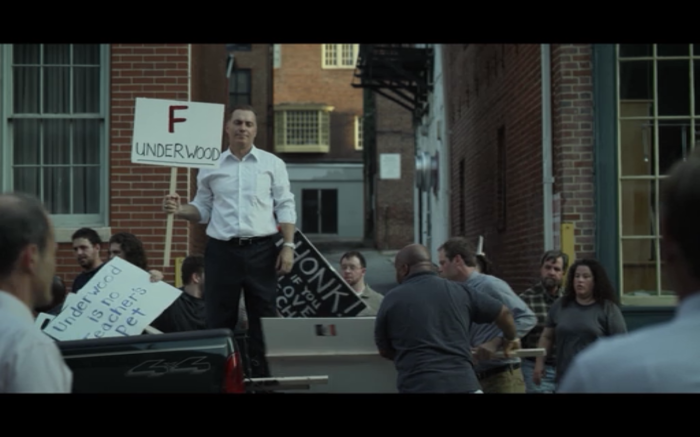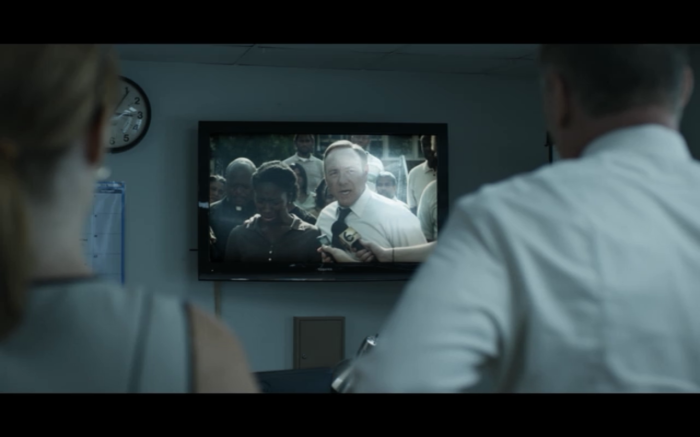Both Frank Underwood and House of Cards are about the big picture. Underwood facilitates an endless amount of small, ruthless political moves with some greater goal in mind. House of Cards doesn’t need to worry about individual episodes and can focus on the larger season, hell, even two seasons of narrative. So each little move it makes, like Underwood’s own planning, can theoretically work towards its greater purpose. It’s a luxury traditional TV doesn’t have and it makes this Netflix model its own distinct entity. In that light, it’s no surprise that when House of Cards struggles—which it may a bit in episodes four through six—it’s because the series reverts back to TV strategies rather than Netflix ones.
Episodes 4-6 focus heavily on a multi-episode mini-arc: Marty Spinella (and his teacher’s union) versus Frank Underwood (and his education reform bill). This is a TV staple, with perhaps the best recent example being Louie season three’s Letterman storyline. It’s odd to see House of Cards opt for a classic TV device given the show’s abilities to avoid reliance on such things. But a mini-arc could be beneficial—good ones provide a brief anecdote that reveals a truth about a larger season storyline… bad ones simply fill time.
The Spinella-Underwood feud certainly provides meaty bits of action—heated backroom arguments, full blown strikes, CNN showdowns, a staged break-in, murdered children and fist fights. It looks action-packed and great on paper but the arc isn’t flawless in practice. Spinella isn’t sympathetic even when paired against an increasingly unlikeable Underwood, the action moves super fast and it’s difficult to see how this arc builds toward the larger goals of the season.
Underwood’s ultimate motivation for these 13 episodes is either some type of revenge against Walker or his own political ascension. So how does a messy, drawn-out resolution to an education crisis—one that included the longest teachers strike, caused by Underwood’s errors in the eyes of the Oval office—work towards that? Is it even a challenge that fundamentally complicates that journey? Only time will tell how, and if, this mini-arc truly matters. But if Netflix truly allows narrative to take different paths than cable or network, it’s odd to devote time to an old plot device that may be nothing more than time fodder.
The other TV trope rearing its ugly head came after the first true cliffhanger within House of Cards. Episode four ends with a demand for Zoe Barnes’ heels to come off, episode five begins with Underwood putting his tie on the morning after. The idea of the female reporter sleeping with her male informant is an old, old cliche and it’s particularly surprising given how her advance was denied in episode one.
Like the education reform drama, it’s hard to see the motivation. It seemed like Barnes could get away with innocent flirting and Underwood would still use her as a public mouthpiece. It’s not clear what happened to change Underwood’s mind either. Before he ended his day at the Barnes’ apartment, Underwood successfully orchestrated the ousting of Senator Rasmussen and the ascension of Senator Womack to Majority Leader. Sure, it sounds stressful, but isn’t it just another day the office for Underwood? Hard to believe that particular bit of politics drove him to seek refuge in a quick fling.
At least with the Barnes situation, the end game is clearer. This trio of episodes further reinforced the strategic abilities of Underwood. He took out a high ranking Democratic Senator with only a few meetings, manipulated the DNC to position his lackey (Russo) as the PA governor candidate and used any means necessary (student death PR, staged home attacks) to bring down one of the most infamous teacher strikes in US history. Underwood is supremely capable, possessing an almost super hero-like quality to succeed against the odds. His power just happens to be ruthless gameplay, an ability to see the big picture and make moves toward it before opponents realize anything. It requires precision and pervasive control —things Underwood appears to be getting lax about with Zoe Barnes (sex changes the control angle and… did he just allow her to keep a single phone against his prior wishes?).
Despite these few minor qualms, episodes four through six keep House of Cards barreling forward. Again, the action moves quick, so even a questionable mini-arc passes without excess lingering (a TV trope that has hurt shows like Sons of Anarchy or The Walking Dead for instance, luckily avoided here). And Underwood’s supreme evil is still an incredibly guilty pleasure. We receive a few supreme moments in this chunk—Russo at the Underwood household, Spinella receiving his brick—that make anything you’d consider “fodder” worth the effort. The game has advanced since Underwood’s step out to South Carolina. Russo is still in his pocket, but now with more political power of his own. Barnes is a more notable journalist who will still listen, but she may actually have some control in their situation. There’s plenty of work to be done in Underwood’s end game, but things will get increasingly complicated until then.



